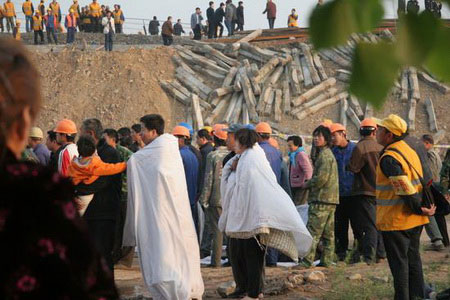
When Zhang escaped from the wrecked train, she saw many villagers had voluntarily joined the rescue work, some smashing train windows with farm tools to free trapped passengers. Others brought food and water from home.
"I saw a girl trying to help her boyfriend out of the train -- only to find he was dead," Zhang said.
Zhang and other survivors also joined the rescue work, using blankets and sheets from the sleeper cars as stretchers to carry out the seriously injured.
"For a time, so many people were trying to make phone calls that the mobile communications network was congested and no one could get through," said a fourth-year college student surnamed Xu, who was traveling from Beijing to Qingdao to visit her boyfriend. She was not injured in the accident.
Wang Xiaoyu, 23, from the northeastern Heilongjiang Province and his girlfriend were also among the lucky passengers on board T195. They were on the seventh carriage, far enough from the 10th to 18th carriages that derailed.
"We were still asleep but felt the train jump twice. Then the whole carriage had a power failure," said Wang. "Within 20 minutes, a stewardess came and told us to join the rescue work."
Wang and several other young men walked about 500 m to the derailed cars. "I pulled seven or eight people out of the wrecked train -- some of them were already dead."
Wang and more than 30 other survivors took a bus to Qingdao at 4:30 pm.
Xu Dongtan, a physician with Zibo Central Hospital, said he arrived at the site at 6 a.m. "I examined at least 110 patients to decide which hospital they were to go to. Most people suffered bruises and fractures," he said.
Patients were sent to 19 hospitals in or near Zibo. The city government has sent a 1,500-member team to help and console victims' families. Nine hotels and 34 rescue centers have been reserved for the victims' families.